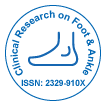हमारा समूह 1000 से अधिक वैज्ञानिक सोसायटी के सहयोग से हर साल संयुक्त राज्य अमेरिका, यूरोप और एशिया में 3000+ वैश्विक सम्मेलन श्रृंखला कार्यक्रम आयोजित करता है और 700+ ओपन एक्सेस जर्नल प्रकाशित करता है जिसमें 50000 से अधिक प्रतिष्ठित व्यक्तित्व, प्रतिष्ठित वैज्ञानिक संपादकीय बोर्ड के सदस्यों के रूप में शामिल होते हैं।
ओपन एक्सेस जर्नल्स को अधिक पाठक और उद्धरण मिल रहे हैं
700 जर्नल और 15,000,000 पाठक प्रत्येक जर्नल को 25,000+ पाठक मिल रहे हैं
में अनुक्रमित
- गूगल ज्ञानी
- शेरपा रोमियो
- जे गेट खोलो
- शैक्षणिक कुंजी
- RefSeek
- हमदर्द विश्वविद्यालय
- ईबीएससीओ एज़
- ओसीएलसी- वर्ल्डकैट
- पबलोन्स
- चिकित्सा शिक्षा और अनुसंधान के लिए जिनेवा फाउंडेशन
- यूरो पब
- आईसीएमजेई
उपयोगी कड़ियां
एक्सेस जर्नल खोलें
इस पृष्ठ को साझा करें
अमूर्त
Diabetes Mellitus Patients on Chronic Care Follow-Up in Southern Hospitals about Diabetic Foot Ulcer Management and Related Factors
Shivam P
Diabetes patients who have diabetic foot ulcers (DFU) have full-thickness wounds below the ankle that penetrate the dermis. Due to the rising prevalence of diabetes mellitus (DM) worldwide and the lack of awareness and practise of diabetic foot self-care, there has been an increase in the incidence of diabetic foot ulcers. As a result, the study's objective was to evaluate patients with diabetes mellitus in southern Ethiopian hospitals' knowledge of and attitudes toward diabetic foot ulcers and related factors. The investigation was carried out using a multicenter cross-sectional design. At Bedele General Hospital and Mettu Karl Comprehensive Specialized Hospital, all diabetes patients who met the study's inclusion criteria and were receiving outpatient care between August 9, 2021, and September 5, 2021 G were questioned using a semi-structured questionnaire. A social science statistical analysis tool was used to analyse the data. Most of the study participants had positive attitudes, while more than half had weak knowledge. Knowledge was highly correlated with age and educational attainment. The following factors were found to be predictive of attitudes toward diabetic foot care: monthly income, educational attainment, prior knowledge, and prior foot ulcer history. Therefore, diabetic foot care education should be offered by healthcare professionals to prevent additional foot ulcer issues. In addition, patients with poor socioeconomic level who have developed diabetic foot ulcers should receive extra care.
विषयानुसार पत्रिकाएँ
- अंक शास्त्र
- अभियांत्रिकी
- आनुवंशिकी एवं आण्विक जीवविज्ञान
- इम्यूनोलॉजी और माइक्रोबायोलॉजी
- औषधि विज्ञान
- कंप्यूटर विज्ञान
- कृषि और जलकृषि
- केमिकल इंजीनियरिंग
- चिकित्सीय विज्ञान
- जीव रसायन
- नर्सिंग एवं स्वास्थ्य देखभाल
- नैदानिक विज्ञान
- नैनो
- पदार्थ विज्ञान
- पर्यावरण विज्ञान
- पशु चिकित्सा विज्ञान
- पादप विज्ञान
- बायोमेडिकल साइंसेज
- भूविज्ञान और पृथ्वी विज्ञान
- भोजन एवं पोषण
- भौतिक विज्ञान
- रसायन विज्ञान
- व्यवसाय प्रबंधन
- सामाजिक एवं राजनीतिक विज्ञान
- सामान्य विज्ञान
- सूचना विज्ञान
क्लिनिकल एवं मेडिकल जर्नल
- आणविक जीव विज्ञान
- आनुवंशिकी
- इम्मुनोलोगि
- एनेस्थिसियोलॉजी
- कार्डियलजी
- कीटाणु-विज्ञान
- कैंसर विज्ञान
- गैस्ट्रोएंटरोलॉजी
- ज़हरज्ञान
- तंत्रिका-विज्ञान
- त्वचा विज्ञान
- दंत चिकित्सा
- दवा
- नर्सिंग
- नेत्र विज्ञान
- नेफ्रोलॉजी
- नैदानिक अनुसंधान
- पल्मोनोलॉजी
- प्रजनन चिकित्सा
- बच्चों की दवा करने की विद्या
- भौतिक चिकित्सा एवं पुनर्वास
- मधुमेह और एंडोक्राइनोलॉजी
- मनश्चिकित्सा
- रुधिर
- रेडियोलोजी
- शल्य चिकित्सा
- संक्रामक रोग
- स्वास्थ्य देखभाल
- हड्डी रोग

 English
English  Spanish
Spanish  Chinese
Chinese  Russian
Russian  German
German  French
French  Japanese
Japanese  Portuguese
Portuguese  Telugu
Telugu